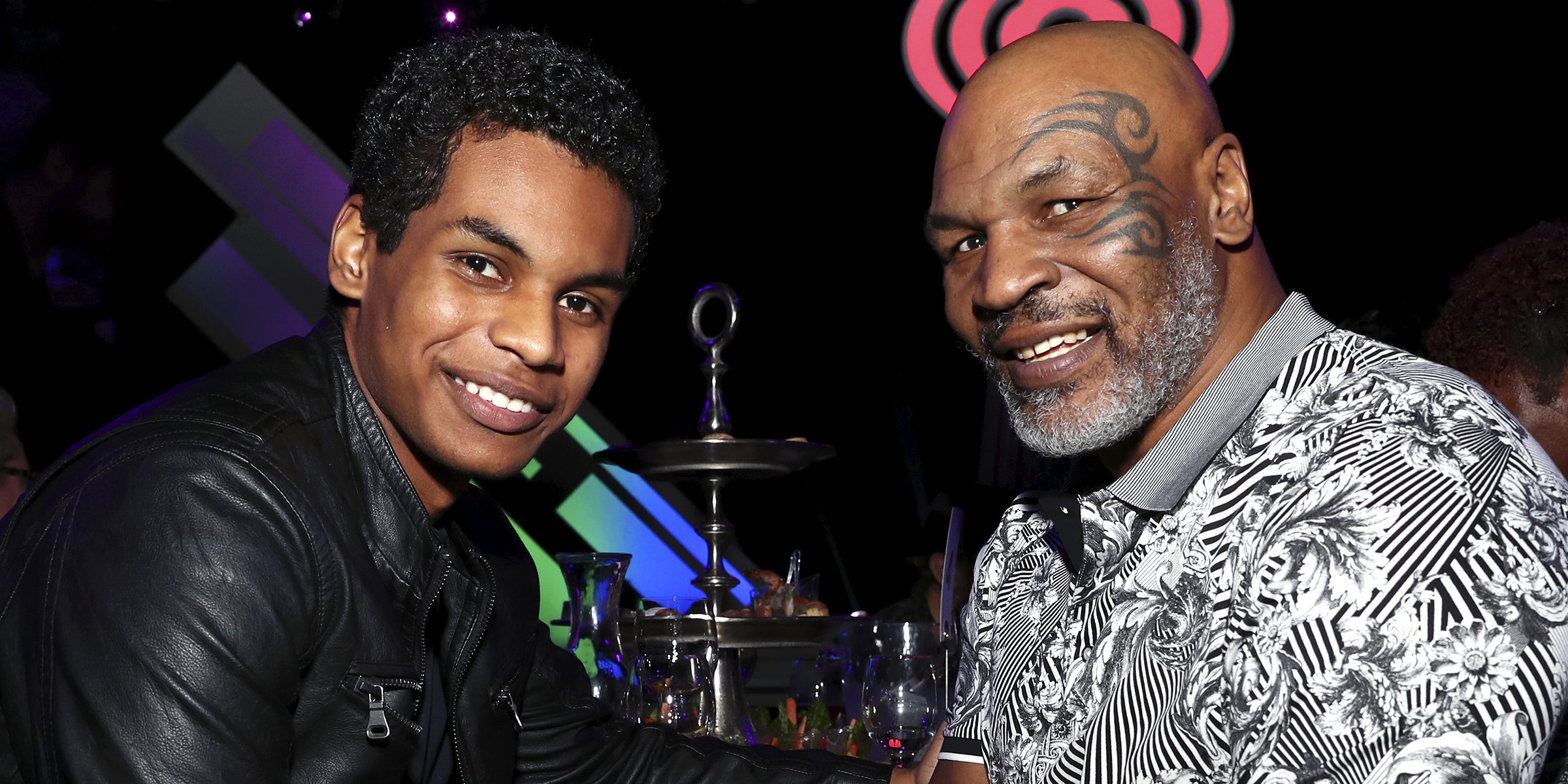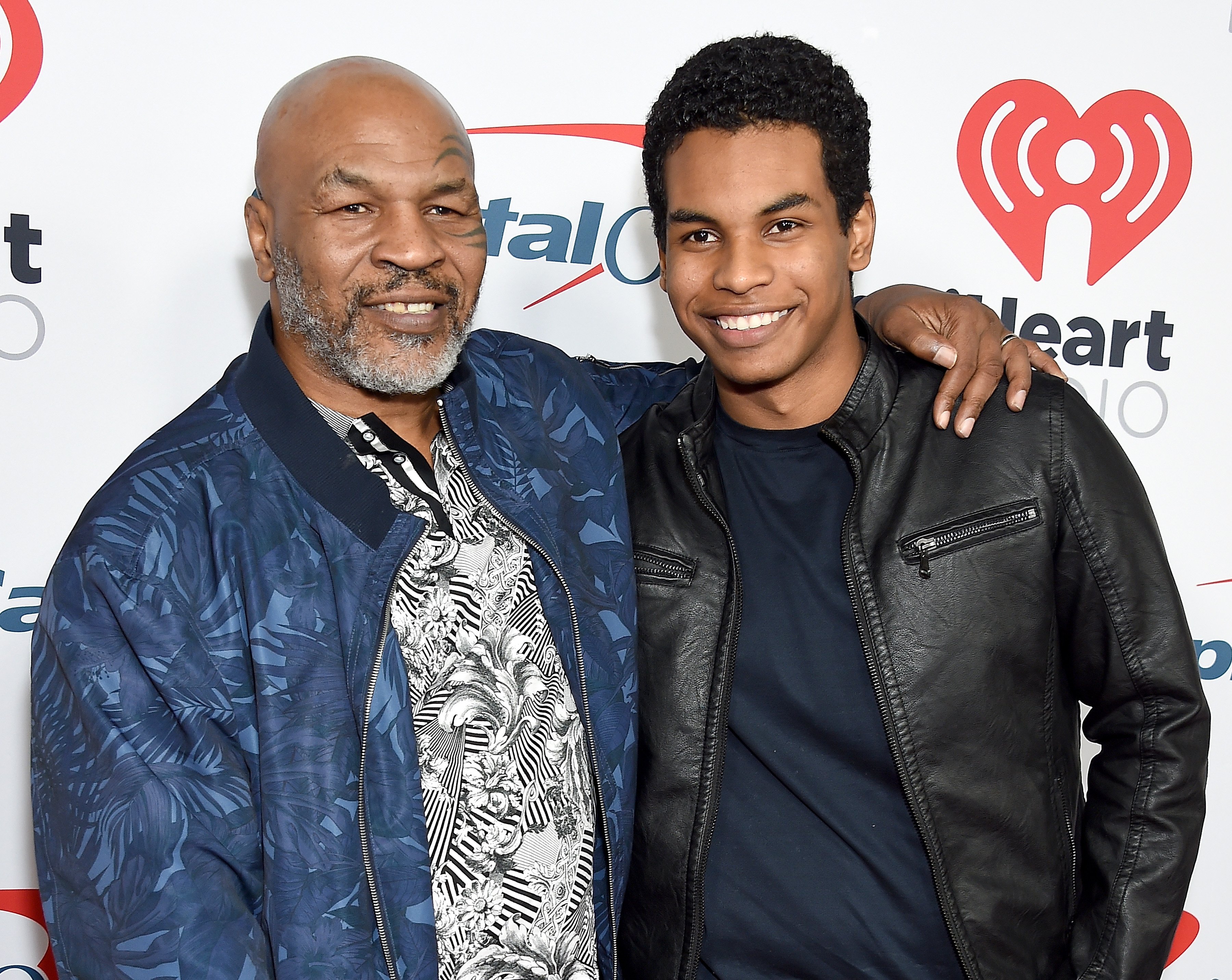Get To Know: Miguel Leon Tyson, The Boxing Prodigy
Who is Miguel Leon Tyson?
Miguel Leon Tyson is a professional boxer who competed from 1985 to 2005. Nicknamed "Iron Mike" and "Kid Dynamite" in his early career, and later known as "The Baddest Man on the Planet", Tyson is considered to be one of the greatest heavyweight boxers of all time.
Tyson won the WBC, WBA and IBF heavyweight titles at 20 years, four months, and 22 days old, becoming the youngest boxer to win a heavyweight title and the only boxer to hold the WBA, WBC and IBF titles simultaneously.
- How Old Is Wade Wilson Uncovering The Age Of The Regenerating Merc
- The Impact Of To Whom It No Longer Concerns Chapter 13 An Unforgettable Literary Journey
He successfully defended his titles nine times, including notable victories over Larry Holmes, Michael Spinks, and Frank Bruno, before losing his titles to James "Buster" Douglas in 1990. Tyson regained the WBA and WBC titles in 1996, and successfully defended them ten times, including notable victories over Evander Holyfield and Lennox Lewis, before losing them to Lennox Lewis in 2002.
Tyson retired from professional boxing in 2005, with a record of 50 wins (44 by knockout), 6 losses, and 2 no contests. He was inducted into the International Boxing Hall of Fame and the World Boxing Hall of Fame in 2011.
Miguel Leon Tyson
Miguel Leon Tyson, known as "Iron Mike" and "Kid Dynamite", is a former professional boxer who competed from 1985 to 2005 and is considered one of the greatest heavyweight boxers of all time.
- Toprated Telugu Movies On Movierulz 2024 Your Ultimate Guide
- Park Bo Gums Dream Girl A Guide To His Ideal Type
- Early life and career: Born in Brooklyn, New York, Tyson began boxing at a young age and quickly rose through the ranks.
- Professional debut: Tyson made his professional debut in 1985 at the age of 18 and won his first 19 fights by knockout.
- Undisputed heavyweight champion: In 1987, Tyson became the undisputed heavyweight champion at the age of 20, becoming the youngest boxer to ever hold the title.
- Controversial career: Tyson's career was marked by both success and controversy, including a prison sentence for rape and several other legal issues.
- Return to boxing: Tyson returned to boxing in 1995 and regained the WBA and WBC heavyweight titles in 1996.
- Retirement: Tyson retired from boxing in 2005 with a record of 50 wins (44 by knockout), 6 losses, and 2 no contests.
Tyson's boxing style was characterized by his aggressive and intimidating approach. He was known for his powerful punches and his ability to knock out opponents with a single blow. Tyson's career was also marked by controversy, including his prison sentence for rape and several other legal issues.
Personal details and bio data of Miguel Leon Tyson
| Full name: | Miguel Leon Tyson |
| Nickname: | Iron Mike, Kid Dynamite |
| Born: | June 30, 1966 |
| Birthplace: | Brooklyn, New York, U.S. |
| Height: | 5 ft 11 in (180 cm) |
| Weight: | 218 lb (99 kg) |
| Reach: | 71 in (180 cm) |
| Stance: | Orthodox |
| Division: | Heavyweight |
| Years active: | 19852005 |
| Record: | 50 wins (44 by knockout), 6 losses, 2 no contests |
Early life and career
Miguel Leon Tyson's early life and career played a crucial role in shaping his path to becoming one of the greatest heavyweight boxers of all time.
- Early influences: Tyson's childhood in Brooklyn exposed him to the harsh realities of street life, which instilled in him a toughness and determination that would later translate into his boxing career.
- Amateur success: Tyson began boxing at the age of 13 and quickly rose through the amateur ranks, compiling an impressive record of 60-9.
- Professional debut: Tyson made his professional debut in 1985 at the age of 18 and won his first 19 fights by knockout, showcasing his exceptional power and potential.
Tyson's early success and rapid rise through the ranks set the stage for his future dominance in the heavyweight division. His aggressive style and intimidating presence made him a formidable opponent, and he quickly became one of the most feared boxers in the world.
Professional debut
Miguel Leon Tyson's professional debut in 1985 marked a significant turning point in his career and the boxing world. His impressive start, with 19 consecutive knockout victories, showcased his raw power and potential, setting the stage for his future dominance in the heavyweight division.
This early success catapulted Tyson into the spotlight and established him as a rising star in boxing. His aggressive style and intimidating presence quickly gained him a reputation as a formidable opponent, and he became one of the most feared boxers in the world. Tyson's professional debut not only marked the beginning of his illustrious career but also served as a testament to his exceptional talent and the relentless determination that would drive him to become one of the greatest heavyweight boxers of all time.
The significance of Tyson's professional debut extends beyond his personal achievements. It also marked a shift in the heavyweight boxing landscape. Tyson's dominance and popularity helped revitalize the heavyweight division, which had been struggling to maintain its appeal following the retirement of Muhammad Ali and Joe Frazier. Tyson's electrifying fights and larger-than-life personality captured the imagination of fans worldwide, rekindling interest in the sport and inspiring a new generation of boxers.
Undisputed heavyweight champion
Miguel Leon Tyson's achievement as the undisputed heavyweight champion in 1987 stands as a testament to his exceptional talent, unrivaled dominance, and enduring legacy in the boxing world.
- Unification of Titles: Tyson's undisputed championship was the culmination of a remarkable journey, in which he captured the WBC, WBA, and IBF titles, consolidating his status as the undisputed ruler of the heavyweight division.
- Youngest Heavyweight Champion: At the age of 20 years, four months, and 22 days, Tyson became the youngest boxer to ever hold the undisputed heavyweight championship, a record that remains unbroken to this day. This achievement underscores his precocious talent and unparalleled rise to the pinnacle of the sport.
- Dominant Reign: Tyson's reign as undisputed heavyweight champion was marked by an aura of invincibility. He successfully defended his titles nine times, dispatching formidable challengers with ruthless efficiency and unmatched power.
- Cultural Impact: Tyson's undisputed championship transcended the realm of boxing, propelling him to global stardom. His electrifying fights and larger-than-life persona captivated the public imagination, making him one of the most iconic and recognizable figures in sports history.
In conclusion, Miguel Leon Tyson's undisputed heavyweight championship was not merely a title but a symbol of his extraordinary abilities, unwavering determination, and enduring impact on the sport of boxing and beyond.
Controversial career
Miguel Leon Tyson's controversial career is an integral part of his persona and legacy, shaping both his public perception and his personal journey.
Tyson's legal troubles began early in his career, with a rape conviction in 1992 that resulted in a six-year prison sentence. This incident cast a dark shadow over his reputation and tarnished his image as a sporting hero.
Beyond the rape conviction, Tyson faced numerous other legal challenges, including assault charges, disorderly conduct, and drug possession. These incidents further damaged his public image and led to a decline in his popularity.
Despite his legal troubles, Tyson's boxing career continued, albeit with diminished success. He regained the WBA and WBC heavyweight titles in 1996, but his reign was short-lived, and he faced criticism for his aggressive and unsportsmanlike conduct.
Tyson's controversial career highlights the complex and often contradictory nature of fame and success. Despite his remarkable achievements in the ring, his personal life and legal troubles have overshadowed his sporting legacy.
The connection between Tyson's controversial career and his overall persona is significant. His legal troubles have shaped public perception of him, both as a boxer and as a public figure. They have also had a profound impact on his personal life, affecting his relationships, finances, and mental health.
In conclusion, Miguel Leon Tyson's controversial career is an important aspect of his story. It is a reminder that even the most successful individuals can face personal challenges and that fame and fortune do not always equate to happiness or fulfillment.
Return to boxing
Miguel Leon Tyson's return to boxing in 1995 marked a significant chapter in his career, further solidifying his legacy as one of the greatest heavyweight boxers of all time.
After serving a prison sentence for rape, Tyson's boxing license was revoked in 1992. However, in 1995, the Nevada Athletic Commission reinstated his license, allowing him to make a comeback.
Tyson's return to the ring was highly anticipated, and he quickly regained his status as a contender. In 1996, he defeated Bruce Seldon to win the WBA heavyweight title and then went on to defeat Frank Bruno to regain the WBC heavyweight title, becoming a two-time undisputed heavyweight champion.
Tyson's return to boxing was not without its challenges. He faced criticism for his aggressive and unsportsmanlike conduct, and his personal life continued to be plagued by legal troubles.
Despite these challenges, Tyson's return to boxing proved that he was still a force to be reckoned with. His victories over Seldon and Bruno demonstrated his exceptional power and determination, and his legacy as one of the greatest heavyweight boxers of all time was further cemented.
Retirement
Miguel Leon Tyson's retirement from boxing in 2005 marked the end of an illustrious career that spanned two decades and cemented his status as one of the greatest heavyweight boxers of all time.
- Legacy and Impact: Tyson's retirement left a significant void in the boxing world. His unique combination of power, speed, and intimidation had captivated fans and revolutionized the sport. His legacy continues to inspire and influence aspiring boxers and boxing enthusiasts alike.
- Personal Journey: Tyson's retirement also marked a turning point in his personal life. Having faced numerous legal and personal challenges throughout his career, retirement provided him with an opportunity to reflect, grow, and pursue other interests.
- Financial Implications: Tyson's retirement had significant financial implications. Despite earning millions of dollars during his career, Tyson's lavish lifestyle and legal troubles left him with substantial debts. Retirement forced him to confront his financial situation and make adjustments to his lifestyle.
- Health and Wellness: Years of intense boxing had taken a toll on Tyson's physical and mental health. Retirement allowed him to focus on his health, including managing the long-term effects of concussions and other injuries sustained during his career.
In conclusion, Miguel Leon Tyson's retirement from boxing in 2005 was a multifaceted event that impacted not only the sport of boxing but also Tyson's personal and financial life. His legacy as one of the greatest heavyweight boxers of all time remains intact, while his retirement marked a new chapter in his life's journey.
FAQs about Miguel Leon Tyson
This section provides answers to frequently asked questions about Miguel Leon Tyson, his career, and his legacy.
Question 1: What is Miguel Leon Tyson's nickname?
Miguel Leon Tyson is known by several nicknames, including "Iron Mike," "Kid Dynamite," and "The Baddest Man on the Planet."
Question 2: When did Tyson become the undisputed heavyweight champion?
Tyson became the undisputed heavyweight champion in 1987 at the age of 20, becoming the youngest boxer to ever hold the title.
Question 3: How many times did Tyson successfully defend his heavyweight titles?
Tyson successfully defended his heavyweight titles nine times.
Question 4: What was the reason for Tyson's prison sentence?
Tyson was sentenced to six years in prison in 1992 for rape.
Question 5: When did Tyson retire from boxing?
Tyson retired from boxing in 2005 with a record of 50 wins, 6 losses, and 2 no contests.
Question 6: What is Tyson's legacy in the boxing world?
Tyson is considered one of the greatest heavyweight boxers of all time, known for his exceptional power, speed, and intimidation.
These FAQs provide a concise overview of some of the most common questions and concerns regarding Miguel Leon Tyson, his career, and his impact on the sport of boxing.
Transition to the next article section: Miguel Leon Tyson's legacy continues to inspire and influence aspiring boxers and boxing enthusiasts alike. His unique combination of power, speed, and intimidation revolutionized the sport, and his impact on boxing culture remains significant.
Conclusion
Miguel Leon Tyson's journey as a boxer is a captivating tale of triumph, adversity, and enduring legacy. His exceptional talent and raw power propelled him to the pinnacle of the heavyweight division, while his controversial personal life and legal troubles cast a shadow over his career.
Tyson's impact on boxing is undeniable. His aggressive style and intimidating presence revolutionized the sport, captivating fans worldwide. His legacy as one of the greatest heavyweight boxers of all time remains intact, inspiring generations of fighters and boxing enthusiasts alike.
Beyond the ring, Tyson's story serves as a cautionary tale about the pitfalls of fame and the importance of personal growth. His struggles and triumphs offer valuable lessons about resilience, redemption, and the enduring power of the human spirit.
Article Recommendations
- Mindy Kalings Mysterious Husband Uncovering The Truth
- The Ultimate Guide To Achieving Big Enviable Bulges



Detail Author:
- Name : Zoey Reilly
- Username : sblanda
- Email : kariane.block@glover.org
- Birthdate : 1994-12-31
- Address : 977 Hamill Court Suite 364 Gislasonside, MI 76661
- Phone : 509.301.0784
- Company : Cummings Group
- Job : Costume Attendant
- Bio : Et consequatur vel debitis id eius. Possimus velit repellat facere nihil. Neque sed et voluptas hic eos iure quia. Ad id dolores repudiandae suscipit.
Socials
tiktok:
- url : https://tiktok.com/@rwalker
- username : rwalker
- bio : Dolores ipsa ab minima omnis voluptatem rem.
- followers : 5863
- following : 2552
facebook:
- url : https://facebook.com/raoulwalker
- username : raoulwalker
- bio : Inventore optio quia qui hic in molestias minus qui.
- followers : 4478
- following : 2050
twitter:
- url : https://twitter.com/raoulwalker
- username : raoulwalker
- bio : Aut accusamus quas quam voluptas nostrum quo enim tenetur. Qui ut voluptatem reiciendis. Quas error ad inventore nostrum repellat.
- followers : 420
- following : 812
instagram:
- url : https://instagram.com/raoul9634
- username : raoul9634
- bio : Id repellendus consequuntur aliquid omnis harum animi. Et sit beatae autem incidunt officiis rem.
- followers : 3914
- following : 1322
linkedin:
- url : https://linkedin.com/in/raoul_walker
- username : raoul_walker
- bio : Quidem quae qui enim sapiente at.
- followers : 548
- following : 2209